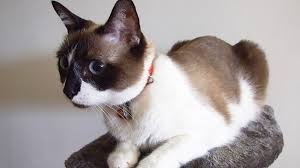
Snowshoe
Conditions of detention
Snowshoes are adaptable and can thrive in various living environments, from apartments to larger homes. They enjoy being part of the family and require an environment where they can interact with their human companions and explore their surroundings.
Useful Fact:
Snowshoes are highly social and thrive in households where they can be part of the family. They often form strong bonds with their human companions and enjoy being involved in daily activities.
Nutrition and diet
Snowshoe cats require a well-balanced diet rich in high-quality protein to support their active and playful nature. A combination of wet and dry cat food can provide the necessary nutrients, vitamins, and minerals. It’s important to avoid overfeeding to prevent obesity, a common issue in domestic cats.
Useful Fact: Snowshoe cats enjoy variety in their diet. Rotating different flavors and types of food can help keep them interested and ensure balanced nutrition.
Health
Snowshoe cats are generally healthy but can be prone to dental issues and obesity. Regular veterinary check-ups are essential for vaccinations, dental cleanings, and overall health monitoring. Early detection of health problems can lead to more effective treatment.
Useful Fact: Regular brushing of their teeth can help prevent dental diseases, which are common in many cat breeds, including Snowshoes.
Grooming and care
Snowshoes have short to medium-length fur that requires minimal grooming. Weekly brushing helps to remove loose hair and reduce shedding. Regular nail trimming, ear cleaning, and maintaining good dental hygiene are important aspects of their care routine.
Useful Fact: Snowshoe cats are relatively low-maintenance compared to long-haired breeds, but regular grooming helps to keep their coat in good condition and strengthens the bond between cat and owner.
Education and training
Snowshoe cats are intelligent and can be trained to perform various commands and tricks. Positive reinforcement, using treats and praise, works best. They can also be trained to use a litter box and scratching posts effectively.
Useful Fact: Snowshoes are quick learners and enjoy interactive training sessions, which can be a great way to mentally stimulate them and keep them engaged.
Toys and entertainment
Snowshoes are playful and enjoy a variety of toys, especially those that challenge their intellect and simulate hunting behaviors. Interactive toys, puzzle feeders, and feather wands are particularly popular.
Useful Fact: Regular playtime with a variety of toys helps to keep Snowshoe cats physically active and mentally stimulated, reducing the risk of behavioral problems.
Safety
Creating a safe environment for Snowshoe cats involves securing windows and balconies, keeping harmful substances and plants out of reach, and providing safe climbing and exploration areas. Ensuring they are microchipped and have an ID tag is also important.
Useful Fact: Snowshoes are curious and adventurous, so it’s crucial to cat-proof your home to prevent accidents and injuries.
Accessories
Snowshoe cats benefit from having various accessories such as comfortable beds, scratching posts, climbing trees, and interactive toys. High perches and window seats can provide entertainment and exercise opportunities.
Useful Fact: Investing in sturdy scratching posts and climbing trees can help keep your Snowshoe cat entertained and active, preventing destructive behavior.
Socialization
Snowshoe cats are social and enjoy interacting with people and other pets. Early and consistent socialization helps them develop into confident and friendly adults. Exposure to different environments and experiences is beneficial.
Useful Fact: Snowshoe cats are known for their affectionate nature and often seek out human companionship, making them great family pets.
Travel and Transportation
Snowshoe cats generally adapt well to travel if introduced gradually. A secure, comfortable carrier is essential for trips to the vet or other travels. Familiarizing your cat with the carrier and taking short practice trips can help reduce travel anxiety.
Useful Fact: Using a carrier with a soft, familiar blanket can make travel more comfortable and less stressful for your Snowshoe cat.
Behavior and psychology
Snowshoe cats are known for their affectionate, social, and playful nature. They form strong bonds with their owners and enjoy being involved in family activities. They can be vocal and use a range of sounds to communicate.
Useful Fact: Providing plenty of attention, interactive playtime, and mental stimulation can help prevent behavioral issues such as excessive meowing or destructive behavior.
Legal aspects
Owning a Snowshoe cat involves certain legal responsibilities, including ensuring they are vaccinated and registered according to local laws. Compliance with regulations regarding pet ownership, breeding, and transportation is important.
Useful Fact: Check local regulations for specific requirements on pet ownership, such as licensing, spaying/neutering, and microchipping, to ensure you are meeting all legal obligations.


